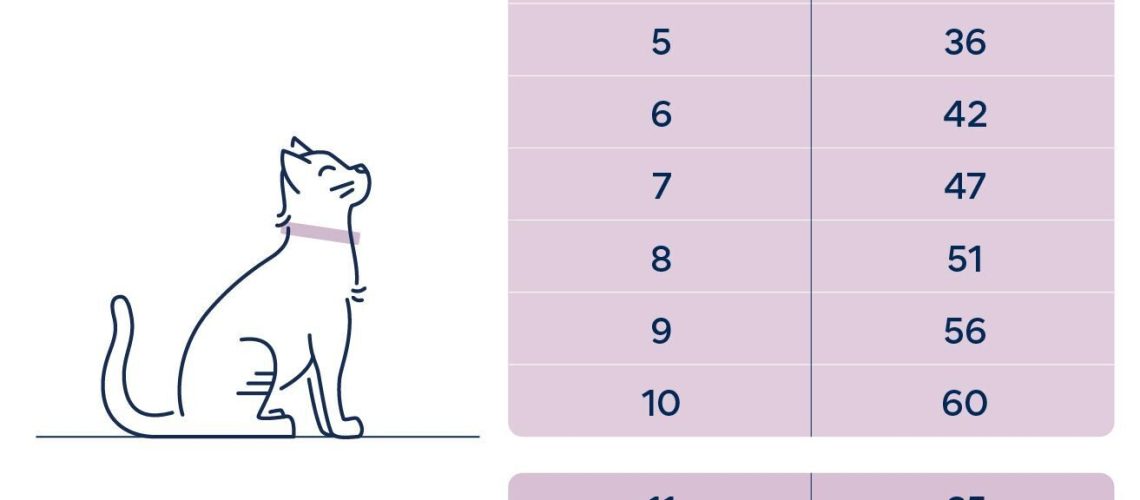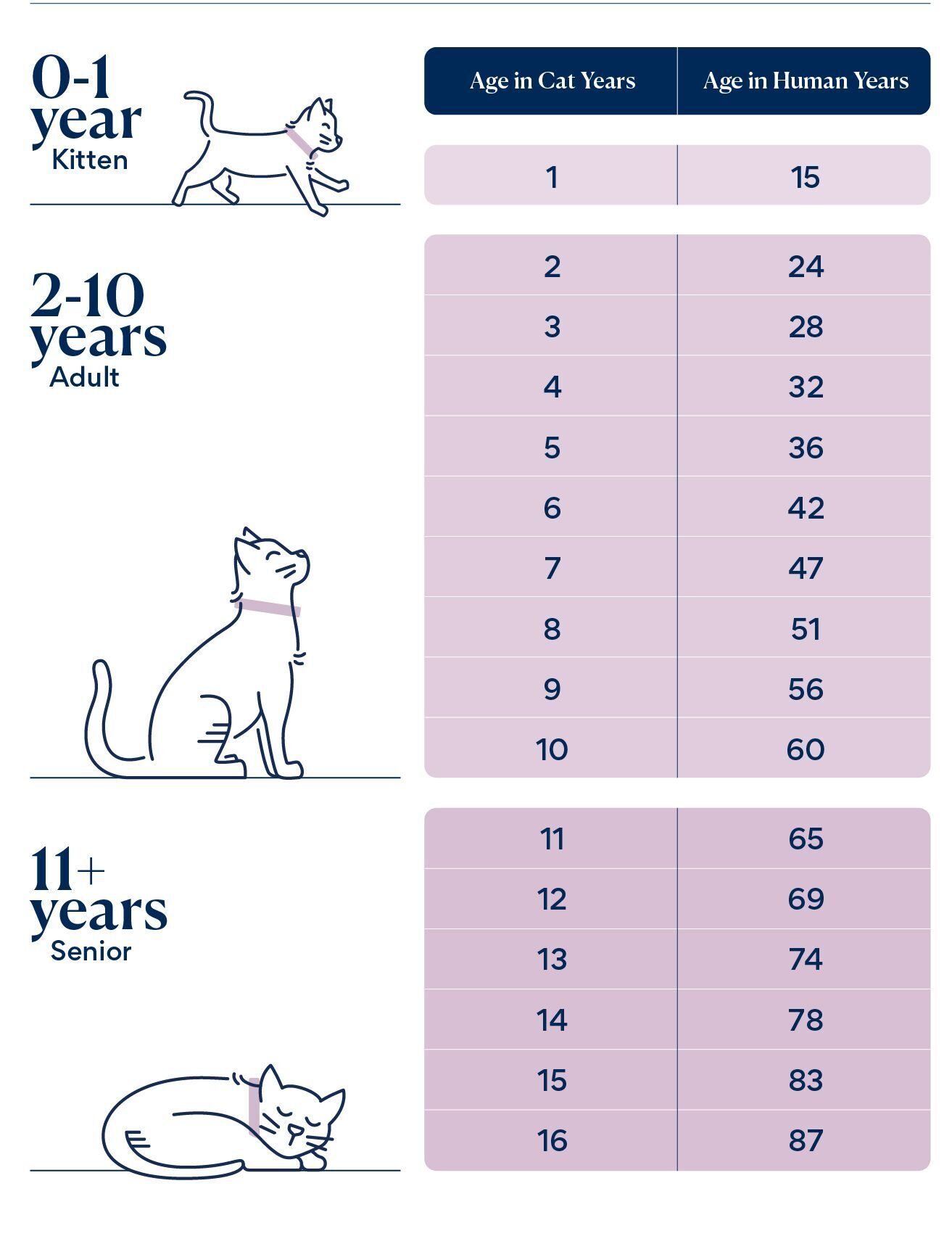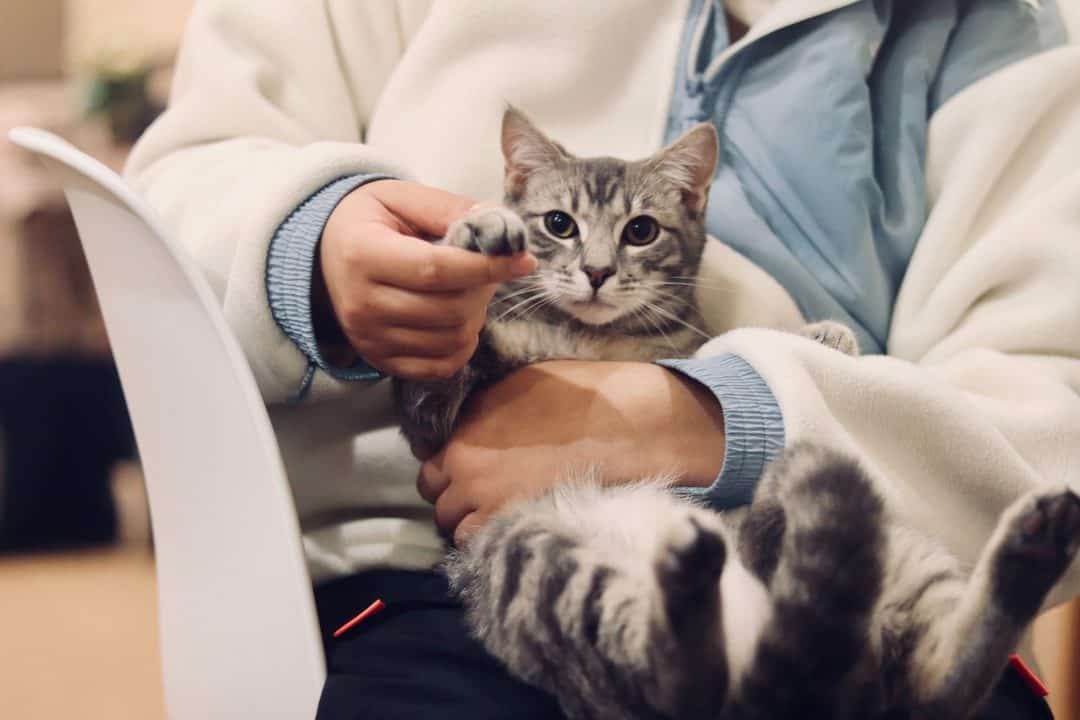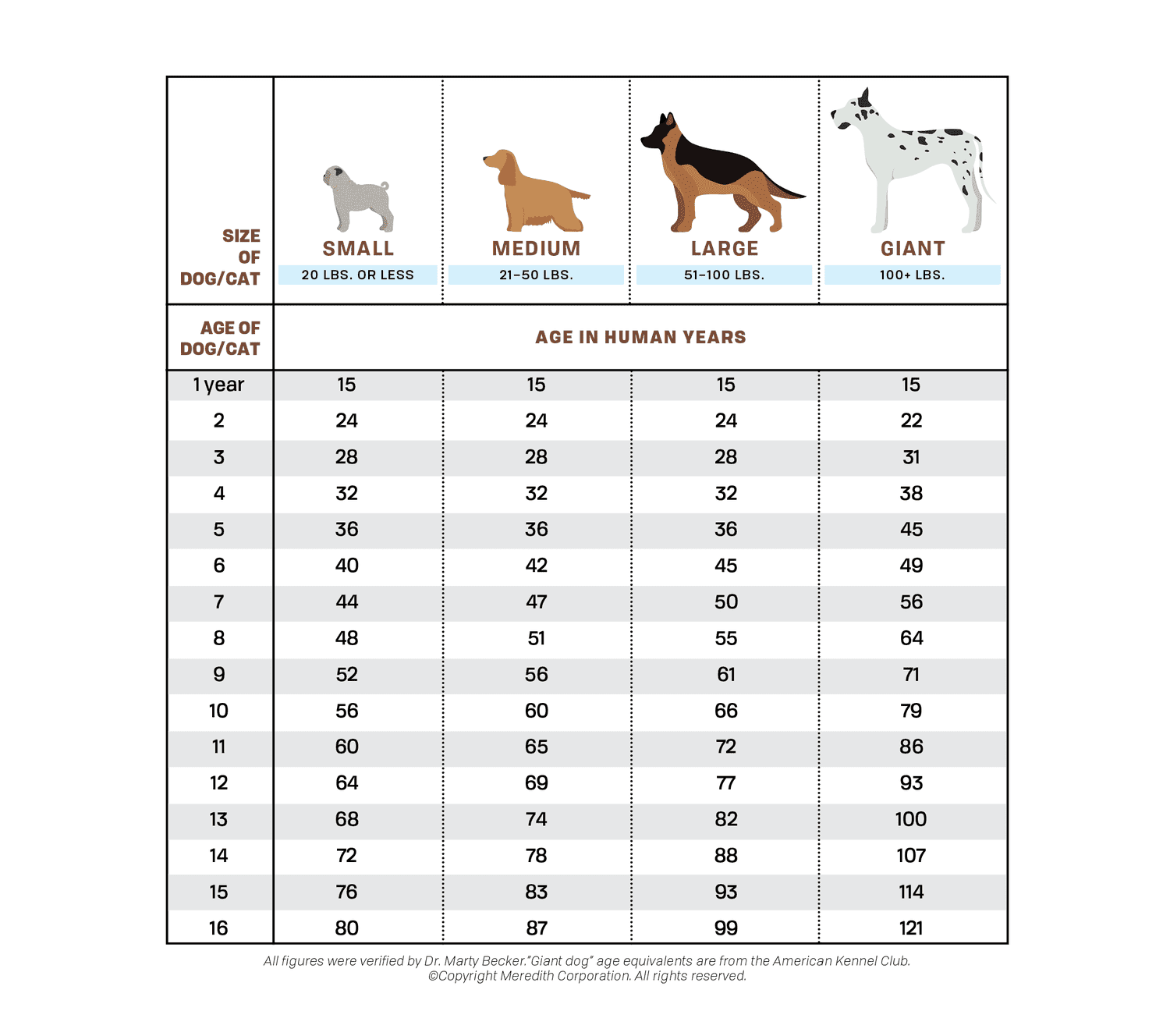Discover how to determine a cat's age in human years, from teeth and physical appearance to factors like breed and genetics. Find out when a one-year-old cat is equivalent to a seven-year-old human.
Key Takeaways:
- Cats age differently than humans, so their age in human years is not a direct conversion.
- The first year of a cat's life is equivalent to about 15 human years.
- After the first year, each additional cat year is approximately equal to 4 human years.
- Factors such as breed and overall health can affect a cat's aging process.
- Regular veterinary check-ups and proper nutrition are important for maintaining a cat's health throughout its lifespan.
How to Determine the Age of Cats in Human Years
Determining a cat's age in human years can be a bit tricky. Unlike humans, cats age at different rates depending on their breed, genetics, and overall health. However, there is a general guideline that can help estimate a cat's age in human years.
One way to determine a cat's age is by looking at their teeth. Just like humans, cats develop baby teeth that are eventually replaced by adult teeth. By examining the condition of their teeth and gums, you can get an idea of how old they might be.
Another method is by observing their physical appearance. Kittens are usually small and have soft fur, while older cats may show signs of aging such as graying fur or reduced mobility. However, this method is not always accurate as some cats may age more gracefully than others.
Factors That Affect How Cats Age Compared to Humans
Several factors influence how cats age compared to humans. One major factor is their size and breed. Smaller breeds tend to have longer lifespans and age slower than larger breeds. For example, a Maine Coon cat may live up to 15 years or more, while a Siamese cat may live up to 20 years.
Genetics also play a role in how cats age. Some cats are genetically predisposed to certain health issues that can affect their lifespan and overall well-being. Regular veterinary check-ups can help identify any potential genetic conditions early on and ensure appropriate care.
The environment in which a cat lives also affects its aging process. Cats that live indoors tend to have longer lifespans compared to outdoor cats who are exposed to various risks such as accidents or diseases.
When is a One-Year-Old Cat Equivalent to a Seven-Year-Old Human?
A common misconception is that one cat year is equal to seven human years. However, the aging process of cats is not as straightforward as that. In reality, a one-year-old cat is more equivalent to a teenager in human years.
During their first year, cats experience rapid growth and development. By the time they reach one year old, they are considered young adults. From there on, each additional cat year does not correspond to a fixed number of human years.
After the first year, most cats age about four "cat years" for every human year. This means that a two-year-old cat would be equivalent to a young adult in their early twenties.
Why Do Cats Age Faster Than Humans?
Cats age faster than humans due to several biological factors. One reason is their higher metabolic rate. Cats have a faster metabolism than humans, which means their bodies work harder and age more quickly.
Another factor is telomeres, which are protective caps at the end of chromosomes that shorten with each cell division. Telomeres help determine how many times cells can divide before they become damaged or die off. Cats have shorter telomeres compared to humans, which contributes to their faster aging process.
Feline genetics also play a role in their accelerated aging. Some genes associated with aging-related processes may be more active in cats compared to humans.
Signs and Behaviors that Indicate an Aging Cat
- Reduced mobility: Older cats may have difficulty jumping or climbing stairs due to joint stiffness or arthritis.
- Changes in appetite: Senior cats may eat less or have specific dietary requirements due to dental issues or reduced metabolism.
- Weight changes: Older cats may experience weight gain or loss, which can be a sign of various health issues.
- Behavioral changes: Aging cats may become more reserved or less active. They may also sleep more and have decreased interest in playing.
- Decreased grooming: Cats may have difficulty grooming themselves as they age, leading to matting or unkempt fur.
Comparing the Life Expectancy of Cats and Humans
Cats generally have shorter lifespans compared to humans. While humans can live well into their eighties or nineties, cats typically live between 12 and 20 years, depending on various factors such as breed, genetics, and overall health.
The average lifespan of an indoor cat is typically longer than that of an outdoor cat due to reduced risks from accidents, predators, and diseases. However, with proper care and regular veterinary check-ups, some cats can live well into their twenties.
A Simple Formula to Calculate a Cat's Age in Human Years
To estimate a cat's age in human years after their first year, you can use the following formula:
(Cat Age - 1) x 4 + 15 = Equivalent Human Age
This formula assumes that each additional cat year corresponds to four human years. The "+15" accounts for the rapid growth and development that occurs during a cat's first year of life.
Caring for Older Cats: Similarities with Elderly Humans
As cats age, they require special care similar to elderly humans. Here are some tips for ensuring the well-being of older cats:
- Provide a balanced diet tailored for senior cats' nutritional needs.
- Ensure regular exercise to maintain muscle tone and joint health.
- Keep the environment comfortable and safe, minimizing hazards such as stairs or slippery surfaces.
- Regular veterinary check-ups are crucial for early detection of age-related health issues.
- Offer mental stimulation through interactive toys or puzzle feeders to keep their minds sharp.
Tips for Ensuring Long and Healthy Lives for Cats
To ensure your cat lives a long and healthy life, consider the following tips:
- Provide a balanced diet with high-quality cat food appropriate for their age and breed.
- Keep them hydrated by always having fresh water available.
- Offer regular exercise and playtime to keep them physically active.
- Maintain a clean litter box to promote good hygiene and prevent urinary tract infections.
- Groom them regularly to keep their coat healthy and reduce hairballs.
- Provide regular veterinary care, including vaccinations and preventive treatments for parasites.
Factors That Affect How Cats Age Compared to Humans
Genetics
Just like humans, genetics play a significant role in how cats age. Certain breeds may be predisposed to certain health conditions that can affect their lifespan and overall aging process. For example, some purebred cats are more prone to developing kidney disease or heart problems as they get older.
Diet and Nutrition
The type of diet and nutrition a cat receives throughout its life can greatly impact how it ages. Feeding a balanced and nutritious diet is essential for maintaining good health and preventing age-related issues. Cats that are fed high-quality cat food with the right balance of nutrients are more likely to age gracefully and have fewer health problems.
Lifestyle and Environment
The lifestyle and environment in which a cat lives can also affect its aging process. Cats that live indoors tend to have longer lifespans compared to outdoor cats due to reduced exposure to hazards such as accidents, predators, and diseases. Additionally, providing mental stimulation, regular exercise, and a stress-free environment can contribute to a healthier aging process for cats.
When is a One-Year-Old Cat Equivalent to a Seven-Year-Old Human?
Cats mature much faster than humans during their first year of life. While a one-year-old cat may seem young, it is already considered equivalent to a seven-year-old human in terms of physical development. This is because cats reach sexual maturity around six months old and are fully grown by one year old.
However, it's important to note that this equivalence does not continue linearly throughout the cat's life. After the first year, each additional cat year is roughly equivalent to four human years until the cat reaches middle age (around six years old). From then on, each cat year is approximately equivalent to two human years.
Why Do Cats Age Faster Than Humans?
The faster aging process of cats compared to humans can be attributed to several factors. Firstly, cats have a higher metabolic rate than humans, which means their bodies function at a faster pace and experience more wear and tear over time. Additionally, cats have shorter lifespans in general due to evolutionary reasons. In the wild, cats need to reproduce quickly and efficiently to ensure the survival of their species.
Furthermore, cats are more susceptible to certain age-related diseases such as kidney disease and arthritis, which can further accelerate their aging process. The combination of these factors results in cats appearing to age faster than humans.
Signs and Behaviors that Indicate an Aging Cat
As cats age, they may exhibit certain signs and behaviors that indicate the progression of time. These signs can vary from cat to cat but commonly include:
- Decreased activity levels
- Weight gain or loss
- Dental issues
- Changes in coat quality
- Increase in sleeping hours
- Litter box issues
- Joint stiffness or mobility problems
- Behavioral changes such as increased vocalization or aggression
Comparing the Life Expectancy of Cats and Humans
Cats generally have shorter lifespans compared to humans. On average, domesticated indoor cats live between 12-15 years, although some can live into their late teens or early twenties with proper care. In contrast, humans have an average life expectancy of around 70-80 years.
It's important to note that these figures are averages, and individual factors such as genetics, lifestyle, and healthcare can greatly influence the lifespan of both cats and humans. By providing proper care and regular veterinary check-ups, cat owners can help ensure their feline companions live long and healthy lives.
A Simple Formula to Calculate a Cat's Age in Human Years
While there is no exact science to calculate a cat's age in human years, a commonly used formula is to consider the first year of a cat's life equivalent to 15 human years. After that, each additional cat year is roughly equivalent to four human years until the cat reaches middle age (around six years old). From then on, each cat year is approximately equivalent to two human years.
For example, if a cat is eight years old, its approximate age in human years would be 48 (15 + (7 * 4) + (1 * 2)). However, it's important to remember that this formula is an estimation and may not accurately reflect the aging process of every individual cat.
Caring for Older Cats: Similarities with Elderly Humans
As cats age, they require special care similar to elderly humans. Some key similarities include:
Dietary adjustments
Just like elderly humans may need dietary adjustments due to changing nutritional needs or health conditions, older cats may also require modifications in their diet. This could involve switching to senior-specific cat food formulas that cater to their changing nutritional requirements.
Regular exercise
Elderly humans benefit from gentle exercise routines tailored to their abilities and limitations. Similarly, older cats should engage in regular but low-impact exercise activities such as interactive play sessions or short walks under supervision.
Health monitoring
Elderly humans often require more frequent health check-ups and screenings, and the same applies to older cats. Regular veterinary visits become even more crucial to monitor their overall health, detect any age-related issues early on, and provide appropriate treatment.

Tips for Ensuring Long and Healthy Lives for Cats
To ensure long and healthy lives for cats, consider the following tips:
- Provide a balanced diet with high-quality cat food
- Ensure access to fresh water at all times
- Keep up with regular veterinary check-ups and vaccinations
- Provide mental stimulation through interactive toys or puzzle feeders
- Create a safe and enriched environment with scratching posts, perches, and hiding spots
- Promote regular exercise through playtime or supervised outdoor activities
- Maintain good dental hygiene by regularly brushing your cat's teeth or providing dental treats
- Monitor your cat's weight and adjust their diet accordingly to prevent obesity or malnutrition
- Pay attention to any changes in behavior or physical appearance and seek veterinary advice if needed
| Cat's Age | Human Years |
|---|---|
| 1 | 15 |
| 2 | 24 |
| 3 | 28 |
| 4 | 32 |
| So, how old is your cat in human years? | |
How old is cat years?
One way to calculate a cat's age in human years is to add 15 years for the first year of life, then add 10 years for the second year, and finally add 4 years for each subsequent year. Based on this method, a two-year-old cat is roughly equivalent to a 25-year-old human.
How old is a 20 year old cat in human years?
If a cat reaches the age of 20, it is approximately equivalent to 97 human years. Unlike dogs, which have varying human age equivalents based on their size, the formula for cats is the same because they are all generally the same size.
How old is a 12 year old cat in human years?
What is the equivalent human age of my cat? The age of a cat can be determined based on whether it is an indoor or outdoor cat. The table below shows the equivalent human age for cats of different ages:
6 years = 40-56 human years
8 years = 48-68 human years
10 years = 56-88 human years
12 years = 64-104 human years
Is 17 years old for a cat?
According to PetMD, cats generally live for about 13 to 17 years in human years, with 20 years being considered very old. However, the lifespan of a cat can vary depending on factors such as diet, lifestyle, preventive measures, breed, and genetics.
What is the longest life span of a cat?
Burmese cats have a Siamese ancestor, which may be why they have a longer lifespan of 20 to 25 years. Some Burmese cats have even been reported to live into their 30s, with the oldest recorded cat being 35 years old.
What is the oldest cat to ever live?
The Texas cat named Creme Puff holds the record for being the oldest cat to ever live, reaching the age of 38 years and 3 days. Creme Puff was born in August 1967 and passed away in August 2005, as verified by Guinness World Records.
















